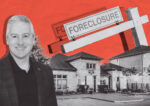 Syndicators are sinking. Who’ll make it out alive?
Syndicators are sinking. Who’ll make it out alive?
Trending
GVA defaults on $125M in Austin loans
Multifamily syndicator faces string of losses across Texas

Problems are mounting for multifamily syndicator GVA.
The Austin-based firm is set to lose two properties to foreclosure after defaulting on nearly $125 million in loans. The apartment complexes, Falls on Bull Creek and Park at Walnut Creek, are the latest to go sideways for GVA. Founded by former golf marketer Alan Stalcup in 2015, the firm recently defaulted on $288 million in loans for Houston properties as well.
GVA purchased Falls on Bull Creek, at 8501-8559 North Capital of Texas Highway, in September 2021 from Nitya Capital. At the same time, it took a $52 million loan from LoanCore Capital. Early last year, residents said running water was lost at the property for 10 days.
Three months after buying that property, GVA acquired Park at Walnut Creek, at 12113 Metric Boulevard. It took a $72 million loan from LoanCore when it made the deal.
Holland & Knight has been appointed the substitute trustee, tasked with selling the properties at auction. Notices were released for the sale of each property, but they advertised a sale date of Dec. 5 at the Travis County courthouse.
More than 30 investors gathered on the steps of the building Tuesday morning, but the only bidding that took place was for foreclosed single-family homes. It is unclear what happened to the scheduled sale, and Holland & Knight did not return a request for clarification.
GVA did not respond to a request for comment.
Across the Sun Belt and in cities across Texas, multifamily syndicators are beginning to lose their properties or negotiate workouts with lenders.
Multifamily investors poured into Texas in 2021 and 2022 as the population and rents kept growing. Many relied on floating-rate debt to buy lower-tier properties at a premium, though. When the Federal Reserve raised rates, their debt payments skyrocketed, and slowed rent growth has made it harder to make up the difference.
Read more
 Syndicators are sinking. Who’ll make it out alive?
Syndicators are sinking. Who’ll make it out alive?
 Foreclosure auction scheduled for GVA-owned apartments near Houston
Foreclosure auction scheduled for GVA-owned apartments near Houston
 As multifamily distress looms, Texas buyers still on the prowl
As multifamily distress looms, Texas buyers still on the prowl




